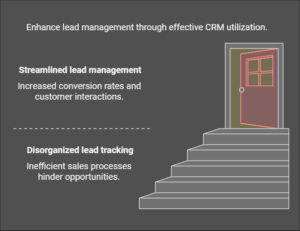
Customer relationship management (CRM) tools play a major role in a company leading its way by organizing and tracking processes in terms of its leads, where it maintains the way not to let any chance pass by in the direction of opportunity. Effective use of CRM systems allows businesses to maintain detailed records of every lead, analyze their behavior, and take personalized actions to guide them through the sales funnel. Companies can, therefore, enhance customer interactions through the usage of CRM tools, increase the efficiency of sales, and ultimately yield higher conversion rates.
In today’s competitive business environment, managing leads manually can be overwhelming and inefficient. CRM tools automate many of these processes, giving businesses real-time insights into lead activity and status. These systems provide a centralized platform for tracking leads, which can significantly improve communication, follow-up efficiency, and decision-making. In this guide, we’ll explore how to use CRM tools for better lead management, enabling you to track and nurture your leads more effectively to drive business growth.
Choosing the Right CRM for Lead Management
Selecting the right CRM tool for your business is critical to achieving effective lead management. Different CRM platforms offer varying features, and the right choice will depend on your business size, industry, and specific needs. Popular CRM tools like Salesforce, HubSpot, and Zoho CRM offer a range of functionalities to help manage and track leads effectively.
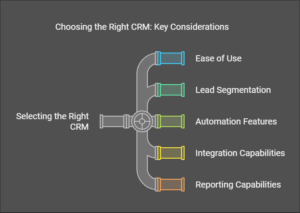
When evaluating CRM options, consider ease of use, lead segmentation capacity, the possibility of easy automation features, integration with your other tools such as email marketing and social media platforms and reporting capabilities. One with excellent automation features should automatically help capture, group, and distribute leads based on specific requirements to each sales representative so that you save even more time, and lessen human errors in the long run.
For small businesses or those just getting started, a simpler, user-friendly CRM might be more appropriate, while larger enterprises may require advanced CRM platforms that offer more customization options and advanced analytics. The right CRM tool will empower your sales team to efficiently track and manage leads, ensuring that no opportunities slip through the cracks.
Capturing and Organizing Leads Efficiently
The most important function of a CRM is that it captures and organizes leads efficiently. What you can do with a CRM is automatically capture leads from multiple sources, including website forms, social media, email campaigns, and even calls. This information is centrally stored in the system to allow easy access and management by your sales team.
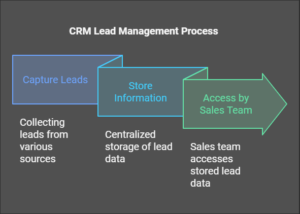
A good CRM enables the segmentation of leads on demographic, interest, and engagement levels. This segmentation is vital in the nurturing process since it helps your team tailor communications and follow-ups according to the needs of each group. For instance, a lead who has downloaded a product brochure may require a different follow-up strategy than a lead who requested a product demo.
Another feature that is present in CRM software is the automation of the capture of leads, which limits the amount of time spent hand-inputting leads, ensuring that there are no inconsistencies in the leads recorded. Organizing captured leads by sales funnel status, such as new, contacted, qualified, or closed, easily depicts how far a lead has converted in the process.
Monitoring Lead Interactions and Engagement
Lead interaction and engagement tracking will enable you to understand how leads behave and what kind of follow-up strategy would work the best. CRM tools provide the ability to track the interaction of leads with your brand, including website visits, email opens, clicks on offers, and social media interactions. This gives you an idea of the level of interest and engagement a lead has with your business, enabling you to prioritize leads that are more likely to convert.
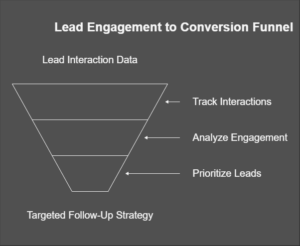
This might be if the leads opened their emails frequently or frequently visited your product pages; thus, it means a person shows more interest in them. Perhaps a more personal kind of follow-up may then be necessary. Other people who aren’t as engaged at such a time require additional nurturing before they make up for a purchase.
By monitoring these activities, the CRM tool enables sales teams to score leads based on their engagement level, which is also known as lead scoring. Lead scoring enables sales teams to focus their efforts on the most promising leads that have the highest chances of successful conversion and avoid spending time on unqualified leads.
Lead Nurturing Automation Using CRM Tools
Lead nurturing is an important aspect of converting potential leads into paying customers. CRM tools provide automation features that can greatly enhance the efficiency and effectiveness of the lead nurturing process. With the automation of follow-up emails, reminders, and personalized messages, CRM systems ensure that leads are constantly nurtured without the need for manual intervention from the sales team.
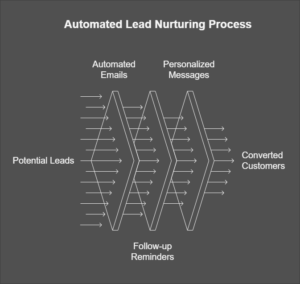
For instance, you can create automated email sequences that send targeted content to leads at specific stages of their journey. This might include welcome emails, product information, special offers, or reminders about abandoned carts. These automated workflows can also trigger follow-ups based on specific actions, such as when a lead downloads a whitepaper or signs up for a webinar.
By automating these repetitive tasks, CRM tools help businesses maintain consistent communication with leads, ensuring that they remain engaged throughout the sales process. Automated nurturing campaigns also reduce the risk of leads slipping through the cracks due to missed follow-ups or lack of attention.
Using CRM to Qualify and Prioritize Leads
Not all leads are equal, and that is why qualifying and prioritizing them effectively is important. CRM tools help businesses qualify leads by tracking their behavior, interactions, and responses to marketing campaigns. The CRM system can assign a lead score based on these factors, with higher scores indicating leads that are more likely to convert.
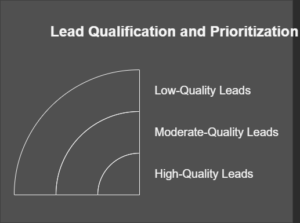
For instance, if a lead interacted with multiple pieces of content, attended a webinar, or asked for a demo, their score could be higher. In that way, such a lead will show the tendency to become a customer and thus would require a sales team’s concentration more.
CRM systems also allow you to track the progress of leads as they move through the sales funnel. Whether they are in the awareness, consideration, or decision-making stage, your CRM can help you tailor your outreach based on where they are in their buyer’s journey, ensuring your sales team delivers the right message at the right time.
Improving Lead Conversion Rates with CRM Analytics
CRM tools offer great analytics and reporting features that can help enhance lead conversion rates. Tracking key metrics like conversion rates, average time to conversion, and sales cycle length helps businesses understand areas for improvement in their lead management and sales processes.
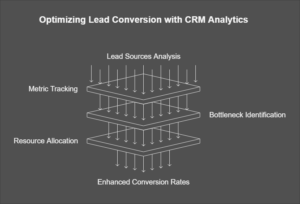
For instance, CRM analytics can uncover which marketing channels or sources of leads produce the best quality leads so that a company can invest more resources into those channels. It can also point out bottlenecks in the sales process: which stages tend to be losing leads, and perhaps which areas require further education on the part of the sales force.
With this information, businesses can make informed decisions to fine-tune their lead generation and conversion strategies. By continuously optimizing lead management processes based on CRM analytics, businesses can improve their overall lead conversion rates and drive more revenue and growth.
Integration of CRM with Other Marketing Tools
To enhance lead management and tracking, it is advisable to integrate your CRM with other marketing tools. Most of the CRM systems offer integrations to email marketing platforms, social media management tools, live chat software, as well as marketing automation platforms. Such integration ensures synchronization of lead information across the board in all tools, hence getting a complete view of where each lead is.
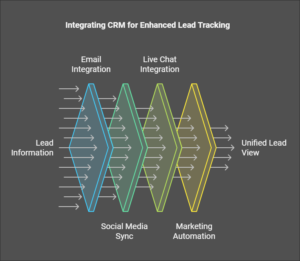
For instance, if you integrate your CRM with an email marketing platform, you can track open rates and clicks on emails, which automatically updates the lead’s status in the CRM. This makes it easier for your sales team to stay informed and respond quickly to leads who are showing interest in your products or services.
Connecting your CRM to other marketing tools will be able to ensure a fluid flow of information, improve communications between your marketing and sales teams, and enhance the lead nurturing experience as being much more personal and efficient.
Measuring and Refining Lead Management Strategies
To ensure that your lead management and tracking strategies are indeed effective, it is also important to measure and refine these regularly. CRM tools offer built-in analytics and reporting features that provide insights into the quality of leads, progression of leads, and sales performance in general. Such metrics help businesses identify trends, challenges, and opportunities for improvement.
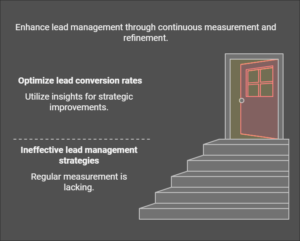
For instance, you may realize that a certain type of lead converts better than others or perhaps leads from a specific source tend to convert more than others. In this way, you can use this information as a guide for lead generation and nurturing, helping refine your strategy over time.
Continuous measurement and refinement are necessary to stay competitive as well as ensure that efforts in lead management continue being effective with changes in market conditions and customer behaviors.
Conclusion:
Leads cannot be managed in the absence of CRM tools. It helps in acquiring and organizing leads, managing interactions, automating nurturing, as well as analyzing performance with a view to improving them. It is one step that would significantly improve one’s lead conversion rates or sales success. It makes sure businesses remain in control of their lead management efforts and grow constantly. The integration of CRM tools with other marketing platforms and constant measurement and optimization ensures this happens. The usage of CRM tools in business is highly effective in making sure there are strong leads that come with a greater sale efficiency and long-term success.